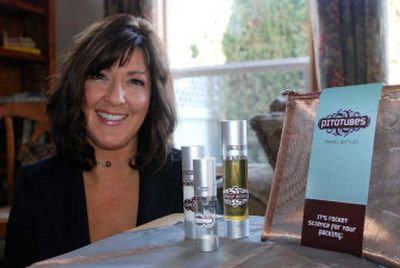Travel bottles are timely idea

BOISE – Most every traveler has experienced the exploded bottle of shampoo in luggage.
No matter how carefully you pack, the rough and tumble of luggage handling can lead to the occasional mess. Alisa Driscoll, president of AMD Travel Accessories in Boise, is no stranger to that phenomenon.
After five years as a flight attendant and 15 years in a touring business that booked scuba dives around the world, she knows how hard it is to find containers that don’t leak.
So she developed her own.
“No one wants to deal with the mess of ruined clothing and luggage,” Driscoll said.
After three years of research and development, Driscoll in March launched a line of travel bottles called Pitotubes that she says have proved to be nearly unbreakable. Her timing was good: With new regulations banning liquid items on carry-on bags, more travelers are putting the products in their suitcases – and need a leak-proof solution.
The Dec. 11 issue of People magazine includes a review of her product, and she said it will be featured on the Travel Channel show “World’s Greatest.”
The bottles are reusable, refillable pump dispensers for transporting personal-care products. The bottles are clear and allow for easy content identification during security checks. They are made of a recyclable plastic called PETG known for its durability.
Her bottles have been dropped from balconies and accidentally run over by cars and still haven’t leaked, she said. She sells the bottles individually for $10. Kits begin at $19.95.
The product is named after a “pitot tube,” which is an indicator on a jet that measures air speed. The name ties in well with the company’s tag line – “It’s rocket science for your packing.”
Driscoll said she never planned to be an entrepreneur. Originally from Seattle, she moved to Idaho in 1999 after being laid off from the airline industry. She didn’t forget about the difficulties of finding a quality bottle that could hold personal-care items without leaking.
“From what I had been hearing from other travelers and from my own experience, this was a problem that wasn’t being addressed, so that gave me the courage to start looking into it,” she said.
In 2003, Driscoll said she started researching and found that there were a number of plastic bottles available, but they weren’t the highest quality and almost always leaked. The bottles also tended to be plain and unappealing, she said.
Now that sales are picking up, she said, she is still looking for potential investors while she focuses on company growth. “We’ve only hit the tip of the iceberg.”